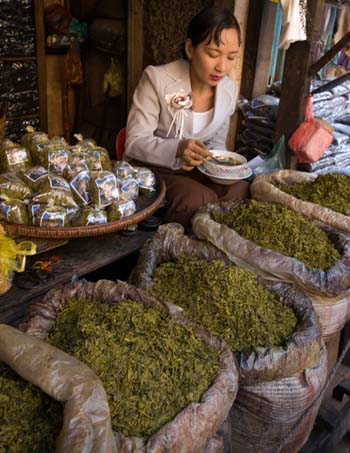
| By MIN LWIN | Wednesday, April 1, 2009 |
Singapore’s food safety agency has ordered a ban on the sale and import of 20 brands of laphet after detecting traces of a prohibited chemical dye in samples of the popular Burmese delicacy.
In an advisory issued on its Web site, Singapore’s Agri-Food and Veterinary Authority (AVA) also urged consumers who have already purchased the implicated products to discard them.
 |
| A laphet shop in Chauk Township, Mandalay Division (Photo: Robin Thom) |
Auramine O, a yellow dye used for coloring silk, cotton, paper and leather. It is a known carcinogen and has been linked to kidney and liver disease.
Kay Thi, the owner of a shop specializing in Burmese products in Boon Lay, Singapore, confirmed that local authorities had halted imports of laphet and dried tea leaves from Burma.
“We are not allowed to sell or import laphet right now,” said the shop owner, whose customers are mainly members of Singapore’s 50,000-strong Burmese community.
On March 12, Burma’s health ministry announced that 43 brands of laphet, a traditional Burmese food made from pickled tea leaves, had been found to contain Auramine O. On March 29, the ministry revealed that the substance had also been discovered in another 57 popular brands.
According to an official from Burma’s Food and Drugs Authority (FDA), the agency has so far tested 100 brands of laphet and found that all contained traces of the dye. The FDA is still testing another 80 brands, the official added.
Although the Singapore ban includes eight varieties of laphet produced by Yuzana, the most popular manufacturer of traditional Burmese snacks, the Burmese health ministry has not yet identified any of the company’s products as unsafe.
Meanwhile, safety concerns have resulted in a dramatic drop in sales of this Burmese staple, which is considered indispensable at social gatherings to mark special occasions.
“The pickled tea business is in bad shape,” said a laphet dealer from the Bayintnaung wholesale market in Rangoon. “We can only sell if we can guarantee that our product doesn’t contain any chemical dye.”
Despite the increased awareness of the dangers of eating food containing chemical dyes, a public health official said that they are commonly used in many foods, including chili powder, snack foods and edible oil.